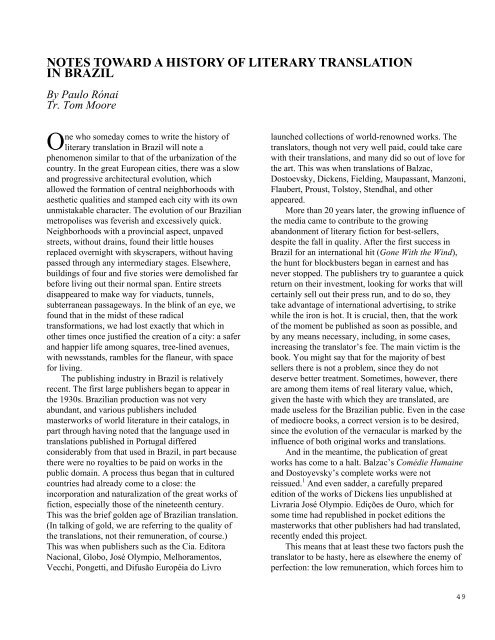their - The University of Texas at Dallas
their - The University of Texas at Dallas
their - The University of Texas at Dallas
Create successful ePaper yourself
Turn your PDF publications into a flip-book with our unique Google optimized e-Paper software.
NOTES TOWARD A HISTORY OF LITERARY TRANSLATION<br />
IN BRAZIL<br />
By Paulo Rónai<br />
Tr. Tom Moore<br />
O<br />
ne who someday comes to write the history <strong>of</strong><br />
literary transl<strong>at</strong>ion in Brazil will note a<br />
phenomenon similar to th<strong>at</strong> <strong>of</strong> the urbaniz<strong>at</strong>ion <strong>of</strong> the<br />
country. In the gre<strong>at</strong> European cities, there was a slow<br />
and progressive architectural evolution, which<br />
allowed the form<strong>at</strong>ion <strong>of</strong> central neighborhoods with<br />
aesthetic qualities and stamped each city with its own<br />
unmistakable character. <strong>The</strong> evolution <strong>of</strong> our Brazilian<br />
metropolises was feverish and excessively quick.<br />
Neighborhoods with a provincial aspect, unpaved<br />
streets, without drains, found <strong>their</strong> little houses<br />
replaced overnight with skyscrapers, without having<br />
passed through any intermediary stages. Elsewhere,<br />
buildings <strong>of</strong> four and five stories were demolished far<br />
before living out <strong>their</strong> normal span. Entire streets<br />
disappeared to make way for viaducts, tunnels,<br />
subterranean passageways. In the blink <strong>of</strong> an eye, we<br />
found th<strong>at</strong> in the midst <strong>of</strong> these radical<br />
transform<strong>at</strong>ions, we had lost exactly th<strong>at</strong> which in<br />
other times once justified the cre<strong>at</strong>ion <strong>of</strong> a city: a safer<br />
and happier life among squares, tree-lined avenues,<br />
with newsstands, rambles for the flaneur, with space<br />
for living.<br />
<strong>The</strong> publishing industry in Brazil is rel<strong>at</strong>ively<br />
recent. <strong>The</strong> first large publishers began to appear in<br />
the 1930s. Brazilian production was not very<br />
abundant, and various publishers included<br />
masterworks <strong>of</strong> world liter<strong>at</strong>ure in <strong>their</strong> c<strong>at</strong>alogs, in<br />
part through having noted th<strong>at</strong> the language used in<br />
transl<strong>at</strong>ions published in Portugal differed<br />
considerably from th<strong>at</strong> used in Brazil, in part because<br />
there were no royalties to be paid on works in the<br />
public domain. A process thus began th<strong>at</strong> in cultured<br />
countries had already come to a close: the<br />
incorpor<strong>at</strong>ion and n<strong>at</strong>uraliz<strong>at</strong>ion <strong>of</strong> the gre<strong>at</strong> works <strong>of</strong><br />
fiction, especially those <strong>of</strong> the nineteenth century.<br />
This was the brief golden age <strong>of</strong> Brazilian transl<strong>at</strong>ion.<br />
(In talking <strong>of</strong> gold, we are referring to the quality <strong>of</strong><br />
the transl<strong>at</strong>ions, not <strong>their</strong> remuner<strong>at</strong>ion, <strong>of</strong> course.)<br />
This was when publishers such as the Cia. Editora<br />
Nacional, Globo, José Olympio, Melhoramentos,<br />
Vecchi, Pongetti, and Difusão Européia do Livro<br />
launched collections <strong>of</strong> world-renowned works. <strong>The</strong><br />
transl<strong>at</strong>ors, though not very well paid, could take care<br />
with <strong>their</strong> transl<strong>at</strong>ions, and many did so out <strong>of</strong> love for<br />
the art. This was when transl<strong>at</strong>ions <strong>of</strong> Balzac,<br />
Dostoevsky, Dickens, Fielding, Maupassant, Manzoni,<br />
Flaubert, Proust, Tolstoy, Stendhal, and other<br />
appeared.<br />
More than 20 years l<strong>at</strong>er, the growing influence <strong>of</strong><br />
the media came to contribute to the growing<br />
abandonment <strong>of</strong> literary fiction for best-sellers,<br />
despite the fall in quality. After the first success in<br />
Brazil for an intern<strong>at</strong>ional hit (Gone With the Wind),<br />
the hunt for blockbusters began in earnest and has<br />
never stopped. <strong>The</strong> publishers try to guarantee a quick<br />
return on <strong>their</strong> investment, looking for works th<strong>at</strong> will<br />
certainly sell out <strong>their</strong> press run, and to do so, they<br />
take advantage <strong>of</strong> intern<strong>at</strong>ional advertising, to strike<br />
while the iron is hot. It is crucial, then, th<strong>at</strong> the work<br />
<strong>of</strong> the moment be published as soon as possible, and<br />
by any means necessary, including, in some cases,<br />
increasing the transl<strong>at</strong>or’s fee. <strong>The</strong> main victim is the<br />
book. You might say th<strong>at</strong> for the majority <strong>of</strong> best<br />
sellers there is not a problem, since they do not<br />
deserve better tre<strong>at</strong>ment. Sometimes, however, there<br />
are among them items <strong>of</strong> real literary value, which,<br />
given the haste with which they are transl<strong>at</strong>ed, are<br />
made useless for the Brazilian public. Even in the case<br />
<strong>of</strong> mediocre books, a correct version is to be desired,<br />
since the evolution <strong>of</strong> the vernacular is marked by the<br />
influence <strong>of</strong> both original works and transl<strong>at</strong>ions.<br />
And in the meantime, the public<strong>at</strong>ion <strong>of</strong> gre<strong>at</strong><br />
works has come to a halt. Balzac’s Comédie Humaine<br />
and Dostoyevsky’s complete works were not<br />
reissued. 1 And even sadder, a carefully prepared<br />
edition <strong>of</strong> the works <strong>of</strong> Dickens lies unpublished <strong>at</strong><br />
Livraria José Olympio. Edições de Ouro, which for<br />
some time had republished in pocket editions the<br />
masterworks th<strong>at</strong> other publishers had had transl<strong>at</strong>ed,<br />
recently ended this project.<br />
This means th<strong>at</strong> <strong>at</strong> least these two factors push the<br />
transl<strong>at</strong>or to be hasty, here as elsewhere the enemy <strong>of</strong><br />
perfection: the low remuner<strong>at</strong>ion, which forces him to<br />
49

















